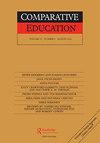比较教育中的人文主义与民主
IF 3.7
1区 教育学
Q1 EDUCATION & EDUCATIONAL RESEARCH
引用次数: 9
摘要
本文认为,由联合国教科文组织和经合组织推动的当代教育政策正在拥抱两种截然不同的后人文主义愿景,我称之为“可持续未来”和“技术解决方案”。我将把这些观点与二战后两个相互冲突的教育议程联系起来:以联合国教科文组织为代表的人文主义解放观点,以及在经合组织中占主导地位的“教育经济学”运动。我认为,比较教育学者最好借鉴该领域的人文主义和民主传统,批判性地分析最近出现的带有非人性化倾向的承诺愿景和主要叙事的范围,并代表对民主的挑战。本文章由计算机程序翻译,如有差异,请以英文原文为准。
Humanism and democracy in comparative education
ABSTRACT This article argues that contemporary education policies promoted by UNESCO and the OECD are embracing two distinct post-humanist visions, which I call the ‘sustainable futures’ and the ‘techno-solutionist’ strand. I will relate these strands to two conflicting agendas of education after World War II: the humanistic-emancipatory perspective represented by UNESCO, and the ‘economics of education’ movement, which was dominant in the OECD. I argue that comparative education scholars would be well advised to draw on the humanistic and democratic traditions of the field in critically analysing the range of promissory visions and master narratives that have emerged recently which carry de-humanising tendencies and represent a challenge to democracy.
求助全文
通过发布文献求助,成功后即可免费获取论文全文。
去求助
来源期刊

Comparative Education
EDUCATION & EDUCATIONAL RESEARCH-
CiteScore
7.40
自引率
21.20%
发文量
35
期刊介绍:
This international journal of educational studies presents up-to-date information with analyses of significant problems and trends throughout the world. Comparative Education engages with challenging theoretical and methodological issues - and also considers the implications of comparative studies for the formation and implementation of policies - not only in education but in social, national and international development. Thus it welcomes contributions from associated disciplines in the fields of government, management, sociology - and indeed technology and communications - as these affect educational research and policy decisions.
 求助内容:
求助内容: 应助结果提醒方式:
应助结果提醒方式:


